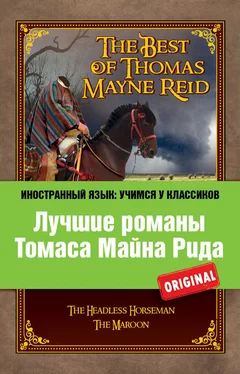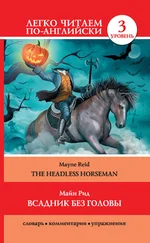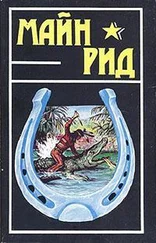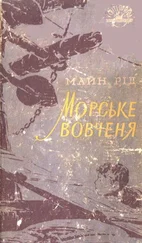Good breeding permitted only a glance at it in passing; which was returned by a like courtesy on the part of the stranger. But as the two rode on, back to back, going in opposite directions, neither could restrain herself from turning round in the saddle, and snatching a second glance at the other.
Their reflections were not very dissimilar: if Louise Poindexter had already learnt something of the individual thus encountered, the latter was not altogether ignorant of her existence.
We shall not attempt to portray the thoughts of the señorita consequent on that encounter. Suffice it to say, that those of the Creole were even more sombre than when she sallied forth on that errand of inspection; and that the young mistress of Casa del Corvo rode back to the mansion, all the way seated in her saddle in an attitude that betokened the deepest dejection.
“Beautiful!” said she, after passing her supposed rival upon the road. “Yes; too beautiful to be his friend!”
Louise was speaking to her own conscience; or she might have been more chary of her praise.
“I cannot have any doubt,” continued she, “of the relationship that exists between them – He loves her! – he loves her! It accounts for his cold indifference to me? I’ve been mad to risk my heart’s happiness in such an ill-starred entanglement!
“And now to disentangle it! Now to banish him from my thoughts! Ah! ’tis easily said! Can I?”
“I shall see him no more. That, at least, is possible. After what has occurred, he will not come to our house. We can only meet by accident; and that accident I must be careful to avoid. Oh, Maurice Gerald! tamer of wild steeds! you have subdued a spirit that may suffer long – perhaps never recover from the lesson!”
Chapter 26 Still on the Azotea
To banish from the thoughts one who has been passionately loved is a simple impossibility. Time may do much to subdue the pain of an unreciprocated passion, and absence more. But neither time, nor absence, can hinder the continued recurrence of that longing for the lost loved one – or quiet the heart aching with that void that has never been satisfactorily filled.
Louise Poindexter had imbibed a passion that could not be easily stifled. Though of brief existence, it had been of rapid growth – vigorously overriding all obstacles to its indulgence. It was already strong enough to overcome such ordinary scruples as parental consent, or the inequality of rank; and, had it been reciprocated, neither would have stood in the way, so far as she herself was concerned. For the former, she was of age; and felt – as most of her countrywomen do – capable of taking care of herself. For the latter, who ever really loved that cared a straw [184] for class, or caste? Love has no such meanness in its composition. At all events, there was none such in the passion of Louise Poindexter.
It could scarce be called the first illusion of her life. It was, however, the first, where disappointment was likely to prove dangerous to the tranquillity of her spirit.
She was not unaware of this. She anticipated unhappiness for a while – hoping that time would enable her to subdue the expected pain.
At first, she fancied she would find a friend in her own strong will; and another in the natural buoyancy of her spirit. But as the days passed, she found reason to distrust both: for in spite of both, she could not erase from her thoughts the image of the man who had so completely captivated her imagination.
There were times when she hated him, or tried to do so – when she could have killed him, or seen him killed, without making an effort to save him! They were but moments; each succeeded by an interval of more righteous reflection, when she felt that the fault was hers alone, as hers only the misfortune.
No matter for this. It mattered not if he had been her enemy – the enemy of all mankind. If Lucifer himself – to whom in her wild fancy she had once likened him – she would have loved him all the same!
And it would have proved nothing abnormal in her disposition – nothing to separate her from the rest of womankind, all the world over. In the mind of man, or woman either, there is no connection between the moral and the passional . They are as different from each other as fire from water. They may chance to run in the same channel; but they may go diametrically opposite. In other words, we may love the very being we hate – ay, the one we despise!
Louise Poindexter could neither hate, nor despise, Maurice Gerald. She could only endeavour to feel indifference.
It was a vain effort, and ended in failure. She could not restrain herself from ascending to the azotea, and scrutinising the road where she had first beheld the cause of her jealousy. Each day, and almost every hour of the day, was the ascent repeated.
Still more. Notwithstanding her resolve, to avoid the accident of an encounter with the man who had made her miserable, she was oft in the saddle and abroad, scouring the country around – riding through the streets of the village – with no other object than to meet him.
During the three days that followed that unpleasant discovery, once again had she seen – from the housetop as before – the lady of the lazo en route up the road, as before accompanied by her attendant with the pannier across his arm – that Pandora’s box [185] that had bred such mischief in her mind – while she herself stood trembling with jealousy – envious of the other’s errand.
She knew more now, though not much. Only had she learnt the name and social standing of her rival. The Doña Isidora Covarubio de los Llanos – daughter of a wealthy haciendado [186] , who lived upon the Rio Grande, and niece to another whose estate lay upon the Leona, a mile beyond the boundaries of her father’s new purchase. An eccentric young lady, as some thought, who could throw a lazo, tame a wild steed, or anything else excepting her own caprices.
Such was the character of the Mexican señorita, as known to the American settlers on the Leona.
A knowledge of it did not remove the jealous suspicions of the Creole. On the contrary, it tended to confirm them. Such practices were her own predilections. She had been created with an instinct to admire them. She supposed that others must do the same. The young Irishman was not likely to be an exception.
There was an interval of several days – during which the lady of the lazo was not seen again.
“He has recovered from his wounds?” reflected the Creole. “He no longer needs such unremitting attention.”
She was upon the azotea at the moment of making this reflection – lorgnette in hand, as she had often been before.
It was in the morning, shortly after sunrise: the hour when the Mexican had been wont to make her appearance. Louise had been looking towards the quarter whence the señorita might have been expected to come.
On turning her eyes in the opposite direction, she beheld – that which caused her something more than surprise. She saw Maurice Gerald, mounted on horseback, and riding down the road!
Though seated somewhat stiffly in the saddle, and going at a slow pace, it was certainly he. The glass declared his identity; at the same time disclosing the fact, that his left arm was suspended in a sling.
On recognising him, she shrank behind the parapet – as she did so, giving utterance to a suppressed cry.
Why that anguished utterance? Was it the sight of the disabled arm, or the pallid face: for the glass had enabled her to distinguish both?
Neither one nor the other. Neither could be a cause of surprise. Besides, it was an exclamation far differently intoned to those of either pity or astonishment. It was an expression of sorrow, that had for its origin some heartfelt chagrin.
Читать дальше
Конец ознакомительного отрывка
Купить книгу











